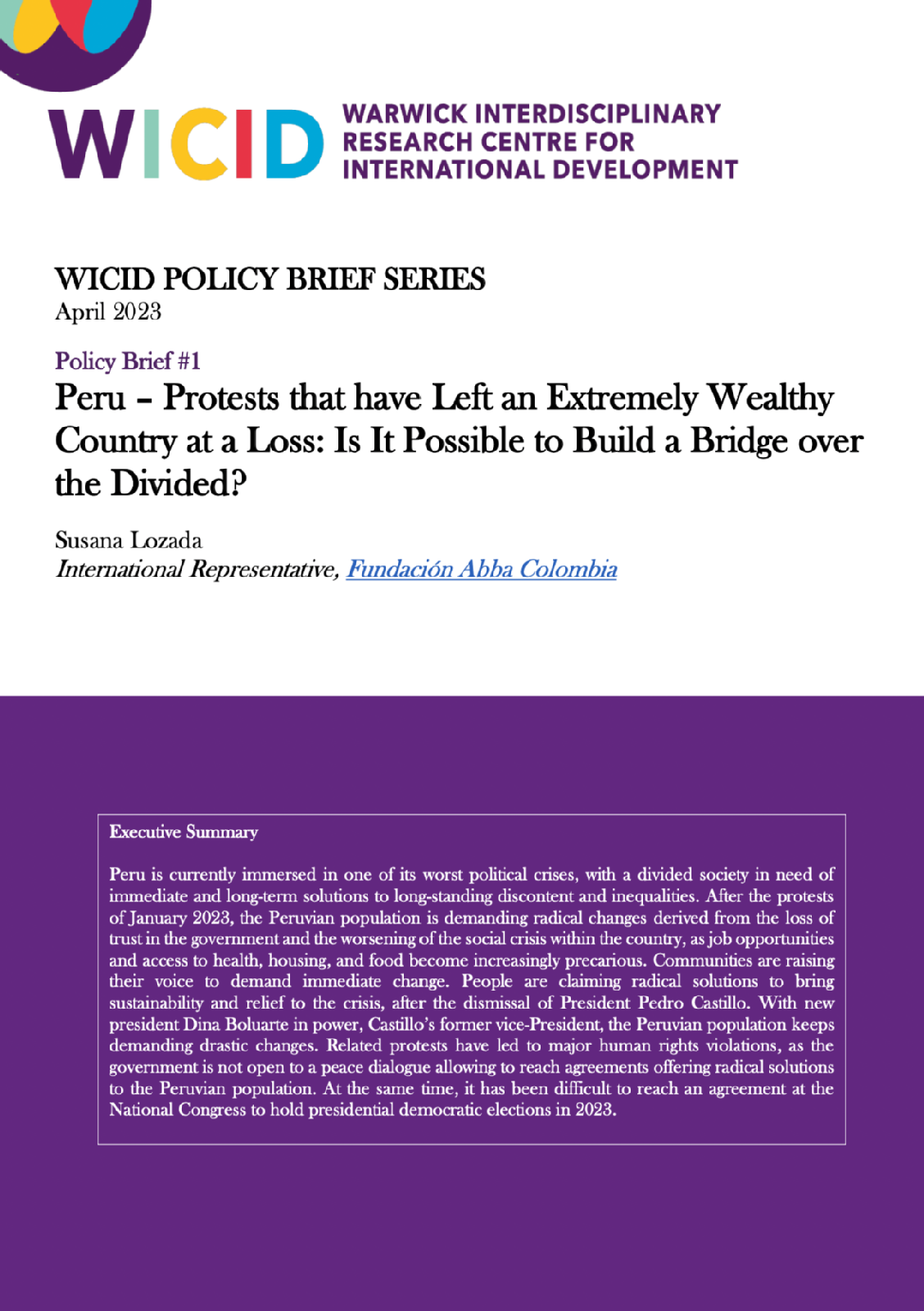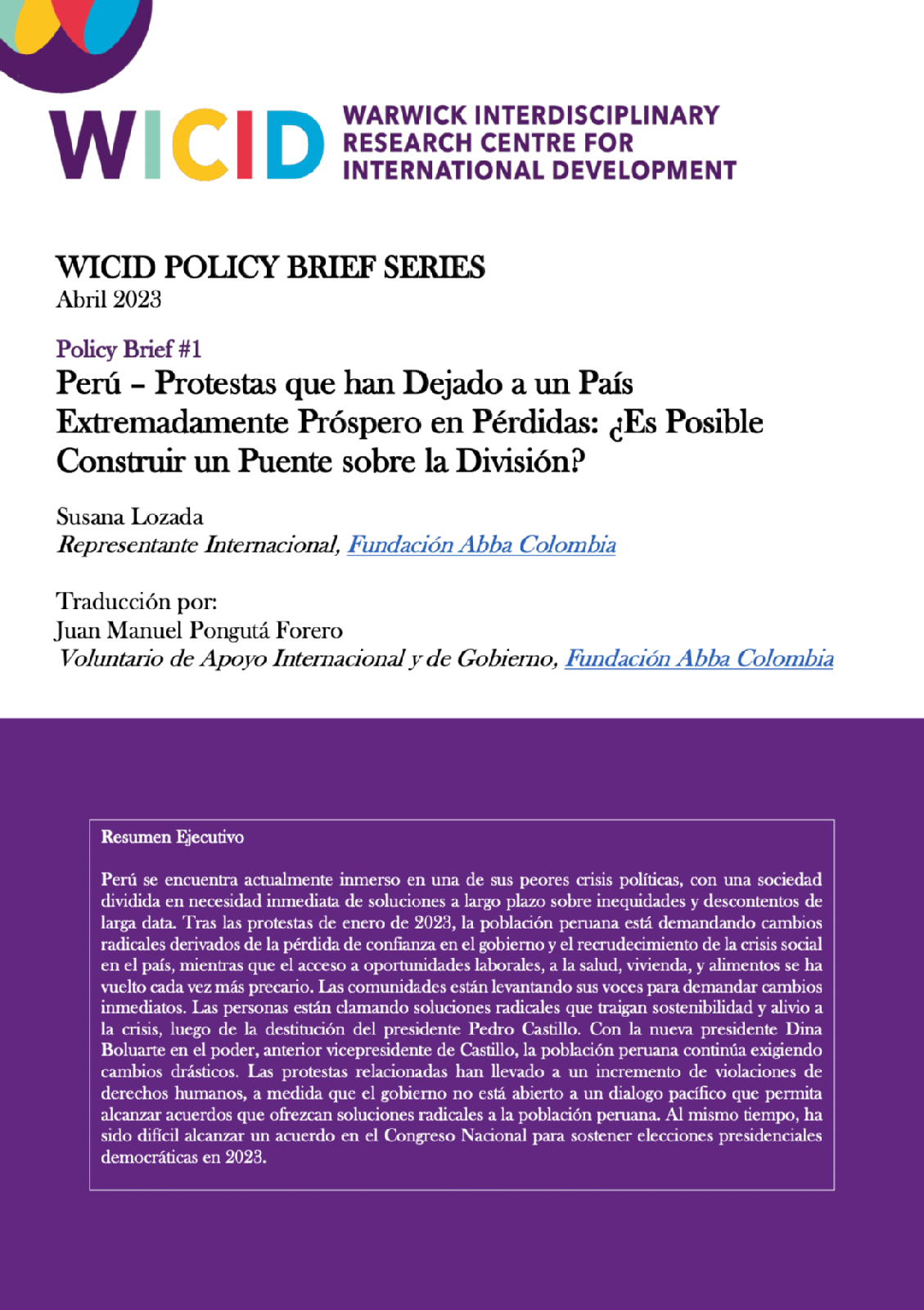WICID Policy Brief Series
WICID Policy Brief Series addresses contemporary issues of international development and inequality within our four research areas: Gender; Mobility; Peace, Conflict, and Justice; Health. We especially welcome submissions of an interdisciplinary nature and those in collaboration with the Global South. Policy briefs are short, standalone documents that draw on a particular issue and provide policy recommendations or implications supported by evidence. They usually prompt certain change or action by conveying clear message to specific audience(s).
If you wish to contribute to this series, please email wicid@warwick.ac.uk for more information.
Policy Brief #1 - April 2023
Click the Policy Brief cover or title to access
Peru – Protests that have Left an Extremely Wealthy Country at a Loss: Is It Possible to Build a Bridge over the Divided?
Author: Susana Lozada, Fundación Abba Colombia
Peru is currently immersed in one of its worst political crises, with a divided society in need of immediate and long-term solutions to long-standing discontent and inequalities. After the protests of January 2023, the Peruvian population is demanding radical changes derived from the loss of trust in the government and the worsening of the social crisis within the country, as job opportunities and access to health, housing, and food become increasingly precarious. Communities are raising their voice to demand immediate change. People are claiming radical solutions to bring sustainability and relief to the crisis, after the dismissal of President Pedro Castillo. With new president Dina Boluarte in power, Castillo’s former vice-President, the Peruvian population keeps demanding drastic changes. Related protests have led to major human rights violations, as the government is not open to a peace dialogue allowing to reach agreements offering radical solutions to the Peruvian population. At the same time, it has been difficult to reach an agreement at the National Congress to hold presidential democratic elections in 2023.
Perú – Protestas que han Dejado a un País Extremadamente Próspero en Pérdidas: ¿Es Posible Construir un Puente sobre la División?
Susana Lozada, Fundación Abba Colombia | Traducción por: Juan Manuel Pongutá Forero
Perú se encuentra actualmente inmerso en una de sus peores crisis políticas, con una sociedad dividida en necesidad inmediata de soluciones a largo plazo sobre inequidades y descontentos de larga data. Tras las protestas de enero de 2023, la población peruana está demandando cambios radicales derivados de la pérdida de confianza en el gobierno y el recrudecimiento de la crisis social en el país, mientras que el acceso a oportunidades laborales, a la salud, vivienda, y alimentos se ha vuelto cada vez más precario. Las comunidades están levantando sus voces para demandar cambios inmediatos. Las personas están clamando soluciones radicales que traigan sostenibilidad y alivio a la crisis, luego de la destitución del presidente Pedro Castillo. Con la nueva presidente Dina Boluarte en el poder, anterior vicepresidente de Castillo, la población peruana continúa exigiendo cambios drásticos. Las protestas relacionadas han llevado a un incremento de violaciones de derechos humanos, a medida que el gobierno no está abierto a un dialogo pacífico que permita alcanzar acuerdos que ofrezcan soluciones radicales a la población peruana. Al mismo tiempo, ha sido difícil alcanzar un acuerdo en el Congreso Nacional para sostener elecciones presidenciales democráticas en 2023.


